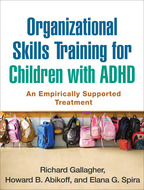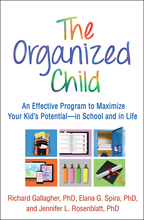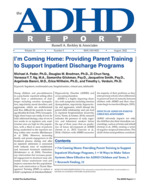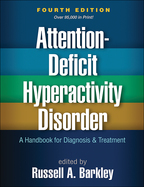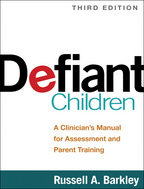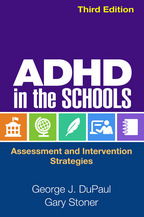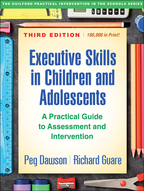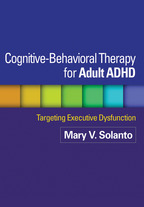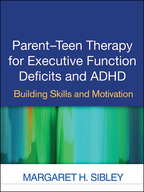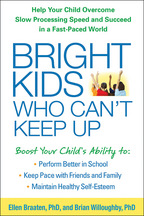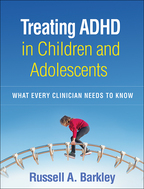Organizational Skills Training for Children with ADHD
An Empirically Supported Treatment
Richard Gallagher, Howard B. Abikoff, and Elana G. Spira
A Paperback Originale-bookprint + e-book
A Paperback Original
orderMarch 26, 2014
ISBN 9781462513680
Price: $60.00 408 Pages
Size: 8" x 10½"
The reproducible materials can be downloaded and printed in PDF format.
“This is a well-done, well-researched, well-documented, and carefully detailed manualized approach….The plan presented has been empirically validated and clinicians can generalize many of the modules to non-ADHD children who may have similar weaknesses in any of these areas. Any graduate mental health program interested in programs for children with ADHD or OST deficits would certainly wish to include this book in their curriculum.”

—Child and Family Behavior Therapy
“If you're interested in helping kids with ADHD battle some of their biggest hurdles—planning, organization, and time management—this book is a 'must read.' This humane, evidence-based, structured yet flexible program is the best argument yet against the claim that there's no validated way to intervene directly with children with ADHD. The book sets a new standard for the field. It enables the clinician to provide essential help for children and families desperately in need of sound treatment.”

—Stephen P. Hinshaw, PhD, Department of Psychology, University of California, Berkeley
“It's here! Practitioners who work with children with ADHD have been eagerly awaiting the publication of this treatment manual by leading clinician-researchers. Demonstrated effective in rigorous research, this intervention is the first to comprehensively address the organizational difficulties that are common and impairing among children with ADHD. Well written, detailed, and thorough, this is a uniquely valuable contribution to the treatment literature.”

—Mary V. Solanto, PhD, Department of Pediatrics and Department of Psychiatry, Zucker School of Medicine at Hofstra/Northwell
“This book provides a complete manual for a new nonpharmacological intervention that guides parents and teachers to work together. Unlike almost every other method for addressing organizational problems in ADHD, this one has been tested in a strong study and the results have passed rigorous peer review. This approach is a gift to children with ADHD and their families from some of the world's top experts.”

—Benjamin B. Lahey, PhD, Department of Psychiatry and Behavioral Neuroscience, University of Chicago
“A timely, important resource. This complete manual includes detailed session scripts and activities, dozens of helpful handouts and checklists that also can be accessed online, and clear guidelines for troubleshooting inevitable treatment challenges. Gallagher, Abikoff, and Spira are to be especially commended for their focus on giving children with ADHD the ongoing support needed to use newly acquired skills on their own.”

—George J. DuPaul, PhD, Department of Education and Human Services, Lehigh University
“This wonderfully practical book focuses on the everyday organizational challenges that kids with ADHD face at home and in school. The authors provide step-by-step guidance for implementing a skills-training program that has been proven to make a real difference for children and families. This approach represents an important advance in the development of targeted interventions to help address key areas of functional impairment in ADHD.”

—Edmund Sonuga-Barke, PhD, School of Psychology, University of Southampton, United Kingdom
“Commonly used ADHD treatments such as medication and parent management training have only a minimal impact on children's organizational skills. Based on a decade of high-quality research, this is the first evidence-based guide for treating organizational skills deficits in this population. Professionals learn how to implement the intervention in collaboration with children, parents, and teachers. Application of this approach will surely improve the lives of children with ADHD.”

—Jeffrey M. Halperin, PhD, Department of Psychology, Queens College and The Graduate Center, City University of New York
—Child and Family Behavior Therapy
“If you're interested in helping kids with ADHD battle some of their biggest hurdles—planning, organization, and time management—this book is a 'must read.' This humane, evidence-based, structured yet flexible program is the best argument yet against the claim that there's no validated way to intervene directly with children with ADHD. The book sets a new standard for the field. It enables the clinician to provide essential help for children and families desperately in need of sound treatment.”
—Stephen P. Hinshaw, PhD, Department of Psychology, University of California, Berkeley
“It's here! Practitioners who work with children with ADHD have been eagerly awaiting the publication of this treatment manual by leading clinician-researchers. Demonstrated effective in rigorous research, this intervention is the first to comprehensively address the organizational difficulties that are common and impairing among children with ADHD. Well written, detailed, and thorough, this is a uniquely valuable contribution to the treatment literature.”
—Mary V. Solanto, PhD, Department of Pediatrics and Department of Psychiatry, Zucker School of Medicine at Hofstra/Northwell
“This book provides a complete manual for a new nonpharmacological intervention that guides parents and teachers to work together. Unlike almost every other method for addressing organizational problems in ADHD, this one has been tested in a strong study and the results have passed rigorous peer review. This approach is a gift to children with ADHD and their families from some of the world's top experts.”
—Benjamin B. Lahey, PhD, Department of Psychiatry and Behavioral Neuroscience, University of Chicago
“A timely, important resource. This complete manual includes detailed session scripts and activities, dozens of helpful handouts and checklists that also can be accessed online, and clear guidelines for troubleshooting inevitable treatment challenges. Gallagher, Abikoff, and Spira are to be especially commended for their focus on giving children with ADHD the ongoing support needed to use newly acquired skills on their own.”
—George J. DuPaul, PhD, Department of Education and Human Services, Lehigh University
“This wonderfully practical book focuses on the everyday organizational challenges that kids with ADHD face at home and in school. The authors provide step-by-step guidance for implementing a skills-training program that has been proven to make a real difference for children and families. This approach represents an important advance in the development of targeted interventions to help address key areas of functional impairment in ADHD.”
—Edmund Sonuga-Barke, PhD, School of Psychology, University of Southampton, United Kingdom
“Commonly used ADHD treatments such as medication and parent management training have only a minimal impact on children's organizational skills. Based on a decade of high-quality research, this is the first evidence-based guide for treating organizational skills deficits in this population. Professionals learn how to implement the intervention in collaboration with children, parents, and teachers. Application of this approach will surely improve the lives of children with ADHD.”
—Jeffrey M. Halperin, PhD, Department of Psychology, Queens College and The Graduate Center, City University of New York

